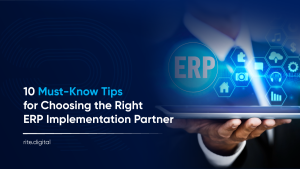Implementation and Support
Strategy and Consulting
Finance modernization is often an essential aspect of ERP implementations for business process transformation. Your Oracle ERP Cloud Service provider must have strong domain expertise and experience in Oracle ERP Cloud strategy and consulting to achieve the desired outcomes. Adopting best-practice implementation methodologies and data-driven processes can support digital initiatives and accelerate the project. For complex initiatives that need advanced expertise, evaluate the ability of the service provider to design solutions through a proof of concept.
Change Management
Oracle ERP Cloud provides the flexibility to adapt to each customer’s unique needs through various configuration options. Service providers must be able to guide enterprises through the correct configuration that is best suited to their requirements. Organizations must adapt to the configuration constraints of Oracle ERP Cloud, which might require different ERP processes than the organization typically uses. It is therefore recommended to keep customizations to a minimum. Change management and training can help you transition seamlessly to Oracle ERP Cloud, especially if there is a wide gap between your existing and future processes.
Oracle ERP Cloud Specialization
Oracle ERP Cloud has diverse functional and technical elements requiring unique expertise. Therefore, a customer must fully understand the service provider’s competency for each cloud application involved in the Oracle ERP Implementation. Most Oracle ERP Cloud Service providers have Financials Cloud competencies but might lack expertise in other modules. Examine the Oracle ERP cloud specializations of the service providers to ensure they have the right technical and functional knowledge. Evaluate the number of required cloud applications and proposed consultants’ certifications.
Data and System Integration
The single most significant cost factor in Oracle ERP Implementations is the required level of system integration. Oracle ERP Cloud implementations typically require data cleansing, migration efforts, and integration with other business applications. These complex projects need master data management, information architecture, analytics, security, identity, and access management expertise. Businesses must focus more on integration and Oracle ERP Cloud-specific tools and integration points. Given the potential costs, organizations must evaluate the service provider’s expertise with specific applications and databases they are running or planning to run.
Availability of Skilled Resources
Oracle ERP Cloud skills are in high demand due to the wide range of project requirements in scope, complexity, integration, data management, and customization. The choice of a specialized vs. provider with comprehensive capabilities across the Oracle ERP Cloud spectrum depends on your needs. There is a stretched ecosystem due to the high demand for Oracle ERP Cloud consultants, resulting in a shortage of trained and experienced resources. Be sure to vet all resources proposed for your project carefully. Focus on the number of individuals certified in Oracle ERP Cloud and the number of certifications for the deployed products. Be vigilant for bait and switch when a relatively inexperienced one replaces an experienced consultant.
Global Capabilities and Localization
You can deliver a large part of Oracle ERP Cloud Implementation remotely as it is cloud-based. However, workshops for requirements, process design, change management, and training are best done onsite, depending on the scope. Additionally, some organizations prefer a more significant onsite delivery presence. Whether the project is being delivered remotely or onsite, the service provider should have consultants who can adapt quickly to the unique geographical needs of each customer, such as local regulations, labor laws, languages, and cultural factors.
Industry Expertise
Oracle ERP Cloud Service Providers have different focus areas and capabilities across various industries. Most ERP projects can be executed without deep industry expertise as the domain and processes are usually similar across sectors. However, complex implementations and those with significant business process changes may require providers to have industry-specific knowledge or expertise (templates, accelerators, etc.) that can accelerate the implementation and reduce costs. Assess your requirements for industry specialization and ensure that service providers have the necessary expertise to meet these needs.
Testing and Training
As end-user environments become cluttered with more applications, devices, and functionality, your service provider must offer training that targets specific user and application requirements. Training will deliver value only if applied to the correct user profiles and application types in an intuitive format. Your Oracle ERP Cloud Service Provider must tailor the training to the different users and applications and dedicate expert resources to assess training requirements and develop curricula.






